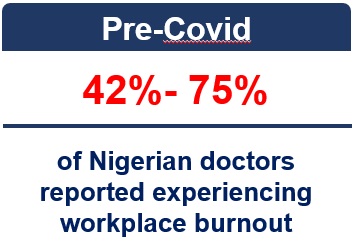Burnout in Nigeria's Workplaces: Risk Factors, Warning Signs and Solutions
By: Foluke Akinwalere. Health & Wellness Writer. Medical reviewed by editorial support from the DLHA Team.

A tired black office worker sitting at a desk, looking stressed, overwhelmed and sleepy. Image credit: Chatgpt
Have you ever felt like you’re running on empty at work?
You wake up tired even after sleeping, drag yourself through the day, and stare blankly into space or a computer screen when available, wondering when this cycle will end. You used to enjoy your job, but now, even the smallest task feels heavy. You tell yourself to “man up” or “try harder,” but deep down, you know something is off.
That feeling isn’t weakness, it’s burnout.
In recent years, burnout has become a silent epidemic in Nigerian workplaces. From overstretched nurses and teachers to overworked bankers and manufacturing employees, many professionals are quietly struggling with exhaustion, cynicism, and a loss of motivation.
But here’s the truth: burnout doesn’t happen overnight. It builds up slowly, fueled by certain risk factors common in many Nigerian workplaces. Understanding these causes is the first step toward preventing them, both for individuals and employers.
In this article, you will learn about what burnout really means, the risk factors driving it in Nigeria, warning signs to watch for, and practical ways to reduce its impact.
Burnout is more than ordinary work stress. Burnout is a state of emotional, mental, and physical exhaustion caused by prolonged and excessive stress — particularly from work. The World Health Organisation (WHO), defines burnout as an occupational phenomenon that results from chronic workplace stress that has not been successfully managed.
While everyday work stress might make you feel tense or tired after a busy day, burnout is different. It builds up over time and is marked by three main dimensions:
1. Exhaustion — feeling drained and unable to cope
2. Cynicism — a negative or detached attitude toward work
3. Reduced professional effectiveness — feeling unproductive or incompetent.
In Nigerian, this definition strongly reflects the reality on the ground. Many workplaces across the country, from corporate offices and hospitals to schools and small businesses, frequently function under high pressure, limited support, and constant uncertainty. [1] According to a report, Nigerian workers are 7th most stressed in Sub-Saharan Africa. [2] Many employees are expected to deliver “100% effort” daily, with little room for rest or mental recovery.
To truly understand burnout in Nigeria, you have to look at the unique realities of its work culture. Nigerian workers operate in highly demanding and unpredictable environments. [3] Many employees face:

Pre-Covid-19 estimates of burnout in Nigerian doctors
Burnout is not new, but it’s worsening. For example, studies have shown that clinical work significantly impacts the mental health of healthcare workers. Prior to the COVID-19 pandemic, doctors were reported to experience high levels of stress and burnout that ranged from 42% to 75% depending on study location and methodology. A single institution research carried out in Lagos, Nigeria during the third phase of the Covid-19 pandemic revealed an average burnout of 49% among doctors. [4]
It should be noted that the burnout rate described in Nigerian doctors cannot be generalised among the broad categories of Nigerian workers. So, more research is needed.
Related: Burnout in Nigerian Nurses
Notwithstanding the paucity of generalisable data, there are still tangible objective evidence to indicate some of the drivers of workplace burnout in Nigerian professionals particularly in the post Covid-19 era. They include:
Drivers of workplace burnout in Nigerian professionals. Click on image to enlarge.
The result? A growing population of talented Nigerians — doctors, teachers, technology workers, civil servants, entrepreneurs — silently battling emotional fatigue, disengagement, and declining wellbeing.
Burnout doesn’t happen in a vacuum. It thrives in certain environments, habits, and organisational cultures. Here are the major risk factors of burnout that Nigerian workers face today:
Risk factors for burnout in Nigeria. Click on image to enlarge.
For many Nigerians, work never truly ends. Long hours, weekend deadlines, and “urgent” late-night calls have become the norm. Employees are often expected to meet impossible targets without adequate resources or breaks. [5]
This “always-on” culture creates constant pressure to perform—and for many, the fear of being replaced keeps them silent. Over time, this leads to physical exhaustion, emotional numbness, and reduced creativity.
In sectors like banking, law, and media, the hustle is glorified. But behind every “hard worker” is often someone silently battling fatigue and self-doubt.
The concept of balance is almost a luxury in Nigeria’s fast-paced economy. A typical Lagos worker may spend 4-6 hours in traffic daily, work late into the night, and still have to manage family or side hustles.
Add societal expectations — such as caring for extended family or attending multiple social obligations — and rest becomes a rare privilege.
Unfortunately, this imbalance leads to chronic stress and leaves little time for recovery. The result? A drained workforce running on autopilot, with little energy left for joy, creativity, or health.
Related: How to Achieve Healthy Work-Life Balance: Tips for Africans
Burnout flourishes in toxic environments. This includes workplaces where:
When people don’t feel safe or valued, they disengage. Many Nigerians have heard phrases like “You’re lucky to even have a job!” — words that silence valid complaints and discourage honesty.
Toxic cultures including female sexual harassment not only damage morale but also contribute to mental health decline and high staff turnover.
Many Nigerian workers feel excluded from decisions affecting their roles or performance. When employees have little say in improving work processes, they feel powerless and undervalued.
This lack of participation reduces motivation and contributes to frustration and emotional exhaustion. Over time, it fosters disengagement and burnout, especially when workloads remain high.
Role ambiguity arises when employees are unclear about their duties or expectations. It’s common in workplaces with vague job descriptions or overlapping responsibilities. Unclear roles create confusion, stress, and self-doubt, especially under pressure to perform. Without defined boundaries, workers struggle to measure success, which leads to anxiety and burnout.
Many Nigerians work hard yet feel stuck. Promotions are often based on connections, favoritism, or tenure rather than merit. Training opportunities are rare, and upward mobility can feel impossible.
When people don’t see progress despite years of effort, hopelessness and frustration set in. This mental stagnation is one of burnout’s biggest drivers, it slowly erodes enthusiasm and replaces it with resignation.
Employees who feel unseen and undervalued start showing up physically but check out emotionally.
With inflation rising, salaries stagnant, and cost of living skyrocketing, financial pressure has become a major source of stress. Many employees work not for passion, but survival.
Unpaid or delayed salaries, job instability, and rising household costs make it difficult for workers to focus. Constant worry about money leads to anxiety, depression, sleepless nights, and declining productivity.
In this kind of environment, burnout isn’t just about work, it’s about survival fatigue.
In Nigerian society, admitting to being tired or overwhelmed can be seen as weakness. The “strong face” mentality teaches people to hide their struggles, smile through pain, and “keep pushing”.
This cultural conditioning discourages help-seeking behaviour. Many professionals fear being labeled lazy or unserious if they take time off. Unfortunately, this silence only deepens burnout and delays recovery.
Info-poster: Warning signs of workplace burnout
Burnout doesn’t announce itself suddenly — it creeps in gradually. Recognising the signs early can help you prevent deeper damage.
Related: How to Recognise the Signs of Burnout In Yourself or Others. A Guide for Africans
In many Nigerian workplaces, mental health struggles are misunderstood. If someone slows down or appears less productive, the immediate judgement is that they’re lazy or unserious.
But burnout isn’t laziness — it’s exhaustion from giving too much for too long. Unfortunately, fear of stigma forces many workers to mask their pain, pretending to be fine while breaking inside.
Recognising burnout as a workplace health issue, not a personal flaw, is the first step toward a healthier workplace.
The cost of burnout goes far beyond individual suffering. It affects the entire organisation and by extension, the economy.
A burned-out workforce is less innovative, less productive, and more likely to disengage. This affects overall national output and workplace culture.
Addressing burnout isn’t just an act of compassion, it’s an investment in long-term performance, sustainability, and national growth.
Burnout prevention requires shared responsibility. Employees, employers, and HR leaders must all play their part.
Managers should model healthy behaviors — taking breaks, respecting boundaries, and showing empathy.
When employers invest in employee well-being, they build loyalty, trust, and long-term success.
Human Resources (HR) professionals have a unique role in shaping workplace culture. They can:
By integrating mental health into company policy, HR leaders can transform the workplace from a source of stress into a space for growth and purpose.
Burnout is not a personal weakness, it's a systemic problem that demands collective solutions. It thrives in environments that prioritise productivity over people and silence over support.
But it doesn't have to stay that way. By fostering awareness, compassion, and open dialogue, Nigerian workplaces can evolve into spaces where employees thrive, not merely survive.
Each small step counts — from taking breaks and setting boundaries to organisations rethinking how they treat their people.
1. Chukwuemeka, U.M., Okonkwo, U.P., Njoku, C.J. et al. Work-related stress, quality of life, and coping mechanism among lecturers in a Tertiary Educational Institution in Anambra State, Nigeria. BMC Psychol 11, 73 (2023). doi: 10.1186/s40359-023-01114-5. Available from here.
2. Pulse Nigeria, Nigerian workers are 7th most stressed employees in Sub-Saharan Africa, [Internet]. 2024 May 9. [Accessed October 7, 2025]. Available from here.
3. World Bank Group, Nigeria Overview: Development News, Research, Data. [Internet]. 2025 October 13. [Accessed November 1, 2025]. Available from here.
4. Pius RE, Ajuluchukwu JN, Roberts AA. Prevalence and correlates of burn-out among Nigerian medical doctors during the COVID-19 pandemic: a cross-sectional study. BMJ Open. 2023 Nov 23;13(11):e076673. doi: 10.1136/bmjopen-2023-076673. Available from here.
5. Kenku A.A., Oshishepo S.A., Hembah S.N., Workload, Job Insecurity And Social Support As Predictors Of Job Satisfaction Among Bank Workers In Keffi, Nasarawa State, Nigeria, South East Journal of Political Science 2023;9(1). Available from here.
Related:
Mental Health Crisis in Nigeria: A Call for Urgent Action
Simple Health Strategies for Families to Boost Mental Wellness
Published: November 25, 2025
© 2025. Datelinehealth Africa Inc. All rights reserved.
Permission is given to copy, use, and share content freely for non-commercial purposes without alteration or modification and subject to source attribution.
DATELINEHEALTH AFRICA INC., is a digital publisher for informational and educational purposes and does not offer personal medical care and advice. If you have a medical problem needing routine or emergency attention, call your doctor or local emergency services immediately, or visit the nearest emergency room or the nearest hospital. You should consult your professional healthcare provider before starting any nutrition, diet, exercise, fitness, medical or wellness program mentioned or referenced in the DatelinehealthAfrica website. Click here for more disclaimer notice.